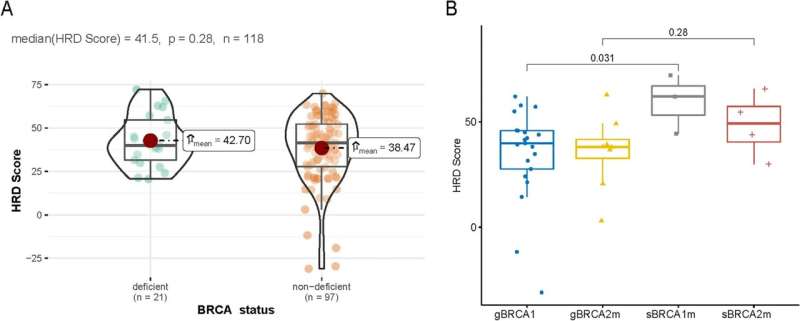This article has been reviewed according to Science X's editorial process and policies. Editors have highlighted the following attributes while ensuring the content's credibility:
fact-checked
proofread
HRD detection predicts sensitivity to platinum-based chemotherapy for ovarian cancer patients in China

Homologous Recombination Deficiency (HRD) is a biomarker that predicts ovarian cancer treatment with PARP inhibitors or breast cancer treatment with first-line platinum-based chemotherapy. However, limited research is documented on platinum-based treatment prediction with HRD as a biomarker in ovarian cancer patients, especially in the Chinese population.
This first-ever China prospective cohort study, jointly conducted by BGI Genomics clinical researcher Dr. Shao Di and the Fudan University Shanghai Cancer Center team and published in the Journal of Ovarian Research indicates that HRD testing can accurately predict the sensitivity of platinum-based chemotherapy for ovarian cancer patients.
The study covered 240 patients with primary treatment of high-grade serious ovarian cancer (HGSOC) admitted to the Cancer Hospital of Fudan University from January 2016 to September 2018 interval. Patients received more than two cycles of platinum-containing adjuvant chemotherapy after surgery and were classified as platinum-sensitive (Pt) and platinum-resistant according to the time of ovarian cancer recurrence.
All patients were tested with a gene panel test screening for 68 HRR genes, to assess the mutation status of HRR-related genes such as BRCA. Of these, 118 samples underwent the HRD test to assess loss of heterozygosity (LOH), telomere allele disequilibrium (TAI), and large segmental recombination abnormality (LST) status. The Kaplan-Meier method was used to plot survival curve and the effectiveness of these tests in predicting patient outcomes.
Out of 240 HGSOC patients enrolled in the study, 82.5% had Pt-sensitive cancer with a platinum-free interval of more than six months. The study shows that 31.2% of patients had BRCA gene mutations, 53 in BRCA1 and 22 in BRCA2. Additionally, 25% of patients had mutations in non-BRCA/HRR genes.
The proportion of patients with positive HRD status was 64.4%. Such results reveal that, compared to Western population, a higher proportion of Chinese ovarian cancer patients benefit from PARP inhibitor maintenance therapy.
HRR gene mutation and HRD status are highly correlated with platinum chemotherapy sensitivity in patients with HGSOC.
Findings showed that the HRD score of platinum treatment-sensitive patients was slightly higher than that of Pt-resistant patients.
Further analysis also found that the rate of Pt-sensitive patients in the HRD+ BRCAm group and HRD+ BRCAwt group was significantly higher than that in the HRD-BRCAwt group.
Similarly, the study also found that Pt-sensitive patients were more enriched in the BRCA mutation group and non-BRCA HRR mutation group than HRR wt group.
Analysis showed that patients with positive HRD status had a significantly longer progression-free survival (PFS) compared to those with negative HRD status (median PFS: 30.5 months vs. 16.8 months, p=0.001).
This study demonstrated for the first time that HRD is a valid biomarker tool for predicting sensitivity to platinum-based chemotherapy in prospective cohort unselected Chinese ovarian cancer patients.
The study also found a higher rate of HRD positivity in Chinese ovarian cancer patients than in Western populations, suggesting that HRD testing could screen a higher proportion of Chinese PARP inhibitor population to facilitate precision therapy.
More information: Zheng Feng et al, Homologous recombination deficiency status predicts response to platinum-based chemotherapy in Chinese patients with high-grade serous ovarian carcinoma, Journal of Ovarian Research (2023). DOI: 10.1186/s13048-023-01129-x


















